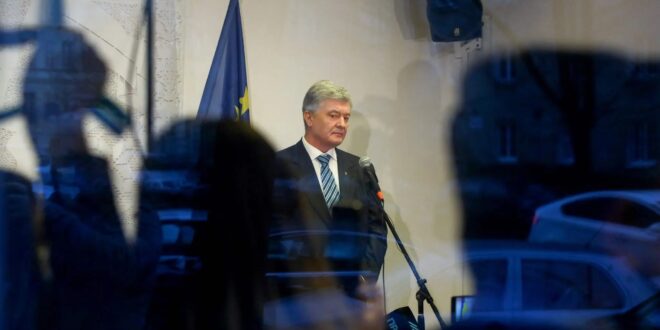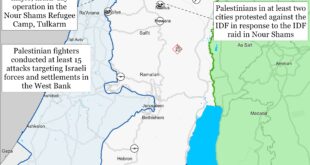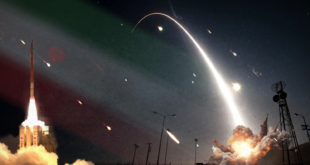Petro O. Poroshenko, a former president, returned to Kyiv on Monday facing possible arrest, adding internal political turmoil to a threat of Russian invasion.
Ukraine’s former president and a leading opposition figure, Petro O. Poroshenko, returned Monday to Kyiv, where he faced possible arrest on charges of treason, adding internal political turmoil to the mounting threat of a Russian invasion.
Mr. Poroshenko led Ukraine from 2014 until 2019, when he was soundly defeated by his rival, Volodymyr Zelensky, the current president. Mr. Poroshenko’s return escalates their long-running feud and focuses attention on Ukraine’s fractious domestic politics, which analysts and critics say is a perilous distraction as the Kremlin masses troops at its border.
Since Mr. Zelensky took power, his government has questioned Mr. Poroshenko as a witness in a raft of criminal cases that he claims are politically motivated. On Monday he said he was under investigation in more than 120 separate cases. Police in the past month have also searched the apartments of members of his political party.
The charges of treason and supporting terrorism stem from his policy as president of allowing the purchase of coal from mines in areas in eastern Ukraine held by Russian-backed separatists, for use in factories in government-controlled territory.
He has said it was a necessary compromise to avoid economic collapse, and denied benefiting personally from any of the deals.
Mr. Poroshenko left Ukraine last month, saying that he had meetings elsewhere in Europe. Prosecutors say he left to avoid a court hearing. But he later announced he would return to Ukraine to face charges, and arrived early Monday at Zhuliani airport in Kyiv.
His hearing lasted all day and into the night without a decision on whether he would be arrested, and the court eventually said a ruling would come on Wednesday.
Mr. Zelensky, a former comedian, scored a landslide victory over Mr. Poroshenko two years ago, running as an outsider to politics who would fight corruption and uproot the entrenched interests of Ukraine’s political class.
But Mr. Zelensky’s popularity has since slumped. Opinion polls today show only a slight advantage in a potential future election against Mr. Poroshenko, who is now a member of Parliament in the European Solidarity party.
Mr. Poroshenko retains a base of support in Ukrainian nationalist politics, particularly in the country’s western regions, which want closer ties with Europe. He has clashed with Mr. Zelensky over the direction of Ukraine’s future, and has criticized him for what he claims is giving ground in peace negotiations with Russia to resolve the war in eastern Ukraine.
His appearance in the capital where he once governed comes after a week of mostly futile negotiations between Russia and the West seeking a solution to tense disagreements over the security of Eastern Europe, which has led to new fears that President Vladimir V. Putin of Russia could soon order a military offensive.
In an interview before his return to Ukraine, Mr. Poroshenko said that his arrest might help Mr. Zelensky sideline a rival but that the political instability would play into Mr. Putin’s hands.
“He wants to undermine the stability in Ukraine,” Mr. Poroshenko said of Mr. Putin. “He analyzes two versions: One version is a military aggression through the Ukrainian-Russian or Ukrainian-Belarusian border. The second is just to undermine the stability inside Ukraine, and in this way just stop Ukraine from our future membership in NATO and in the E.U.”
In Kyiv, opinions differed on whether the threat of an arrest was just another maneuver in Ukraine’s typically byzantine politics at home, or something more ominous related to the Russian threat. Polls have consistently shown Mr. Zelensky and Mr. Poroshenko to be Ukraine’s most popular politicians.
Some analysts suggested that Mr. Zelensky might be seizing on the distraction of the Russian military buildup on the Ukrainian border to sideline an opponent, or that he hoped to tamp down possible opposition protests if he is forced to make unpopular concessions to Moscow to avoid an invasion.
“Maybe he thinks that with forces on the border, Ukrainians won’t protest” an arrest of the opposition leader, said Volodymyr Yermolenko, editor in chief of Ukraine World, a journal covering politics. If so, he said, it is a risky move.
“With the situation on the border, when everybody is yelling, ‘There will be a war,’ it’s very strange,” Mr. Yermolenko said of the spectacle of Ukraine’s two leading politicians squabbling despite the existential threat to their country. “It just seems ridiculous.”
Mr. Zelensky’s aides have said that the charges against Mr. Poroshenko are justified and that courts have already issued arrest warrants for others accused in the same case, including a prominent pro-Russian politician in Ukraine, Viktor Medvedchuk. They have said the courts, not the government, decided the timing of a possible arrest and other actions, including the freezing of Mr. Poroshenko’s assets earlier this month.
Mr. Poroshenko offered no evidence of a Russian hand in the political turmoil and described internal Ukrainian feuds as the most likely cause of the legal pressure he faced. But he said Mr. Zelensky might hope to win concessions from Russia by arresting a politician aligned with the nationalist wing of Ukrainian politics.
“I am absolutely confident this is a very important gift to Putin,” Mr. Poroshenko said. “Maybe with this gift he wanted to launch a negotiation with Putin, as a precondition.”
After massing tens of thousands of soldiers on Ukraine’s border through the fall, Russia demanded last month that the United States and NATO pull back forces from countries in Eastern Europe and guarantee that Ukraine not join the Western alliance.
Diplomatic talks last week with Russia ended inconclusively, and Russian officials now say they are awaiting a written response to their demands from the United States.
As a contingency, in case the Western diplomacy fails, Ukraine has also been quietly pursuing talks with Russia and proposed a bilateral meeting between Mr. Zelensky and Mr. Putin. On Friday, the Ukrainian presidential chief of staff, Andriy Yermak, suggested a three-way video conference with the Russian and Ukrainian leaders and President Biden.
The feud between the current and former presidents is seen as mostly personal, rather than ideological. Mr. Zelensky, former officials have said, was stung by Mr. Poroshenko’s attacks during the presidential campaign in 2019. Mr. Poroshenko’s government in 2017 also banned broadcasts of one of Mr. Zelensky’s most popular comedic television shows, as one of the actors was accused of supporting Russia’s annexation of Crimea, which would be a violation of Ukrainian law.
The feud between the two men continued through the fall and winter, even as Russian forces massed at the border.
“The Russian threat didn’t stop them,” said Orysia Lutsevych, head of the Ukraine program at Chatham House in London.
One motivation for the arrest, she said, may be Mr. Zelensky’s plans to run for a second term in 2024 on a record of removing the country’s wealthy businessmen, known as oligarchs, from politics. Mr. Poroshenko owns a chocolate and candy company.
But the United States government has warned of a possible Russian invasion of Ukraine within weeks or months. It was a point hinted at by Britain’s ambassador to Ukraine, Melinda Simmons, who pointed out the inconvenient timing of the feud in a statement on Monday.
“All political leaders in Ukraine need to unite against Russian aggression right now,” she wrote. “So important at this time not to lose sight of this.”
 Eurasia Press & News
Eurasia Press & News




